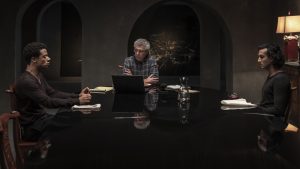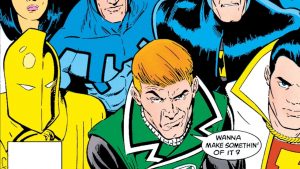
This article contains spoilers for The Lord of the Rings: The Rings of Power season 2 episode 6.
The various plot threads in The Rings of Power are all starting to come together this week as we work towards the season’s climax.
Season 2 episode 6 spends its time with Galadriel and Adar, Celebrimbor and Sauron, Elrond and Gil-galad, the Dwarves, Númenor, the Stoors, and the Stranger and Tom Bombadil. With all of these storylines jostling for position, we of course get more of some than of others, but several characters are able to make a big impact with a little screen time. The Dwarves have only a few scenes, but when Durin III (Peter Mullan) wearily says “The whole world’s gone mad,” one can really empathize with his reluctance to give up anything that seems to give him some kind of hope and power over the world around him. Additionally, Disa (Sophia Nomvete) physically attacking people with the power of singing (helped by some bat-like creatures) is just a fantastic concept that is huge fun to see.
Celebrimbor (Charles Edwards) and Sauron (Charlie Vickers) also have only a few scenes, but unsurprisingly these have some of the greatest impact. Charles Edwards continues to be brilliant as Celebrimbor, a man (or Elf in this case) absolutely on the edge. The fact that it is often hard to tell how much of Celebrimbor’s collapse is Sauron affecting his mind, and how much of it is he himself breaking down in the face of extreme stress and exhaustion, is a testament to Sauron’s power and his ability to hide his manipulations in plain sight, as well as to Edwards’ excellent performance.
We do see the true extent of Sauron’s ability to mess with Celebrimbor’s mind at the end of the episode, as he is able to make Celebrimbor see a beautiful sunny, peaceful day full of happy Elves when in fact, Eregion is under siege (and it is nighttime). This must be one of the most quietly tragic scenes in the series. Celebrimbor smiles in relief as he watches children play and people at peace, but we know that it is a lie, and that those same children are suffering and screaming in a city that is on fire. It is also a timely reminder of just how powerful Sauron truly is.
It is good to see a bit more of Galadriel (Morfydd Clark) this week, though she does not exactly cover herself in glory as she falls for Adar’s tricks. Being deceived by the incredibly powerful Sauron the Deceiver is one thing, but falling for Adar’s fairly basic play is not a high point for her. Galadriel is probably the only character whose storyline is a bit weaker this season than in season 1, but it’s still nice to see her lock horns with Adar (Sam Hazeldine) in his tent, and hopefully she will have a chance to get a bit more involved with the action in the remaining two episodes.
There is some good dialogue in this episode, and the writers are still incorporating a lot of direct quotes from J. R. R. Tolkien. It is always nice to hear Tolkien’s words, though it is also good to hear the writers incorporating their own ideas and dialogue as well. “Faith is not faith if it is not lived,” is an especially nice line that encapsulates an idea Tolkien would thoroughly have approved of effectively.
One Tolkien quotation that sticks out like a sore thumb is when Tom Bombadil (Rory Kinnear) says to the Stranger (Daniel Weyman), “Many that die deserve life; some that live deserve death. Who are you to give it to them?” This is a mis-quote of Gandalf’s words to Frodo in The Lord of the Rings, when Frodo complained that it was a pity that Bilbo did not kill Gollum when he had the chance. Gandalf tells him that “it’s a pity that stayed Bilbo’s hand,” and says, “Many that live deserve death. And some that die deserve life. Can you give it to them? Then do not be too eager to deal out death in judgment. For even the very wise cannot see all ends.” Originally part of Frodo and Gandalf’s long conversation in the Shire, the Peter Jackson film adaptation moved these lines to Moria, but kept the lines and their meaning otherwise unchanged. Gandalf is eventually vindicated when Gollum inadvertently saves the world at Mount Doom by fighting Frodo for the Ring and going down with it.
What Tom Bombadil says to the Stranger here is slightly different and has a completely different meaning. Bombadil is telling the Stranger that he has to choose between saving Nori (Markella Kavenagh) and Poppy (Megan Richards), and learning to use his power – something which is very obviously a test, since it is horribly out of character. The inverted quotation is really quite sinister, implying that it is not worth trying to save someone’s life, which is very different meaning to Tolkien’s; Tolkien (through Gandalf) was saying that we should not be too eager to deal out death to others, not that we should give up on saving lives. Even if this does turn out to be a test (as it almost certainly will), this is a horrible inversion of Tolkien’s line and its meaning, which makes it more of a grating irritation than a nice homage.
Probably-Gandalf is learning to work with the “Secret Fire,” which both confirms that he is almost certainly Gandalf, and shows what his current problem is. The Stranger is frustrated at his inability to “master” the Secret Fire, but when Gandalf confronts the Balrog in The Fellowship of the Ring, he proclaims himself “Servant of the Secret Fire,” indicating that the key is to put yourself in the service of greater forces rather than trying to control them, something Tom Bombadil confirms in this episode when he talks about needing to be “in service of the Secret Fire.” This is another message Tolkien himself would almost certainly have approved of, so we are confident this story is going in a suitably Tolkien-like direction.
The human politicking in Númenor continues, and it’s interesting to see Ar-Pharazôn (Trystan Gravelle) angry at his son Kemen (Leon Wadham) for escalating the situation too quickly – the father is clearly much more clever than his hot-headed son. Gravelle plays a fun mix of sinister, ruthless and, when foiled in his plans, incredibly vexed here. We have been resisting the urge to say the words Game of Thrones when talking about Númenor all season, because it is not fair to either show to keep comparing two very different stories just because they both happen to be epic fantasy and feature swords and dragons. But we do feel like we have to mention it briefly here. Númenor’s storyline is the aspect of The Rings of Power that is genuinely quite similar to Game of Thrones, being about human struggles of power in an invented fantasy setting.
In this episode, we see Elendil (Lloyd Owen) put in almost the exact same position as Ned Stark in season 1 of Game of Thrones. He is ordered to confess to “crimes” he has not committed and does so in order to protect his daughter, who is in a relationship with the prince. When he is ordered to accept Ar-Pharazôn as Númenor’s true king and looks down, the shot is filmed so that it looks very much like one of the most famous shots from Game of Thrones, of Ned Stark looking downwards, about to get his head cut off. The echo gives the scene a deep-seated feeling of threat and tension for anyone who has seen both shows, which is nice, though it can take you out of the story a bit.
Luckily for Elendil, Númenor has a form of the medieval trial by ordeal called trial by abyss, which he is offered on the assumption that it will kill him. As far as we are aware, this is an invention of the show and not something from Tolkien, but if anyone who remembers the details of The Silmarillion and Unfinished Tales better than us knows of a Tolkienian origin for it, let us know below!
The “sea worm” itself is also largely a show invention. The name suggests that it is a sea serpent, something listed as existing in Tolkien’s world in the posthumously published The Lost Road and Other Writings, but otherwise not really described. It looks like a giant squid (more octopus/kraken-like than serpent/dragon-like) and seems to be another relative of the Watcher in the Water who lives outside Durin’s Door in The Fellowship of the Ring.
The trial by abyss is a rather neat idea for a bit of fantastical medieval justice, and it gives Míriel (Cynthia Addai-Robinson) by far her best scene across both seasons of the show. Seeing her take action, using both her knowledge of the law and simple bravery to save Elendil and take back some kind of agency over her life, is a great relief after she has spent most of this season hanging around, being outsmarted by Ar-Pharazôn.
The series continues to quietly develop small romantic storylines in several places, some of which we feel more enthusiastic about than others. Poppy and Nobody’s (Gavi Singh Chera) romance is just simple, sweet goodness – and quite possibly the origin of Hobbits as we know them, so that’s nice. We are less sure about the vaguely romantic vibes between Elendil and Míriel. There’s nothing exactly wrong with the idea, but it seems unnecessary to their plot, and it takes away from the central ideas about power, faith, and fate that are otherwise key to their story and their actions.
The final few minutes of this episode promise a truly epic battle to come in episode 7 – we hope we are not to be disappointed!
Learn more about Den of Geek’s review process and why you can trust our recommendations here.
The post The Rings of Power Season 2 Episode 6 Review: Servant of the Secret Fire appeared first on Den of Geek.







